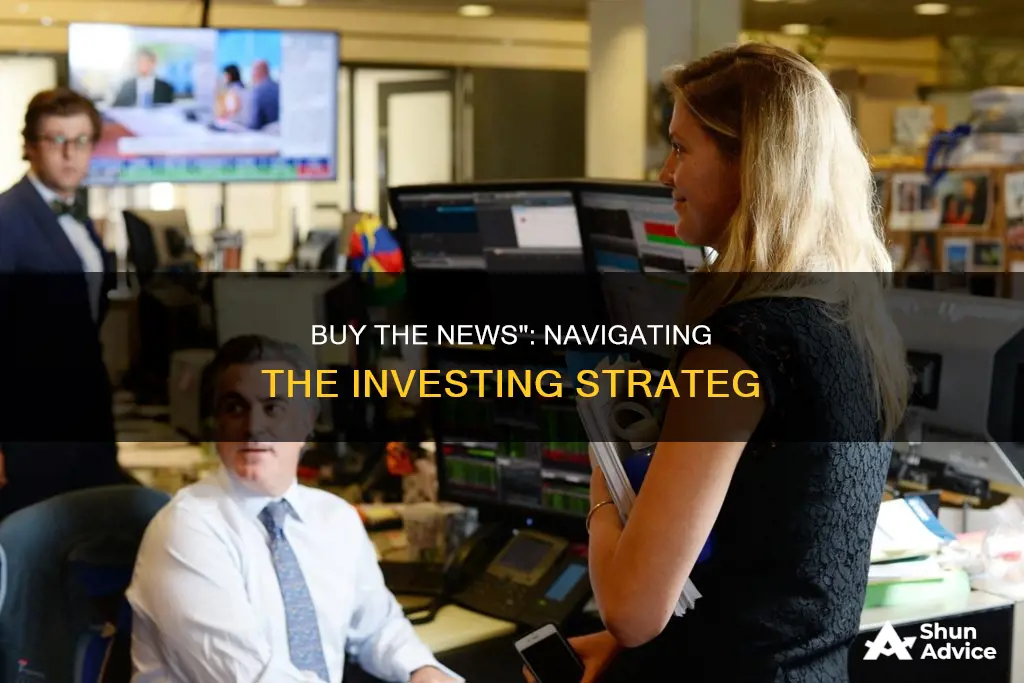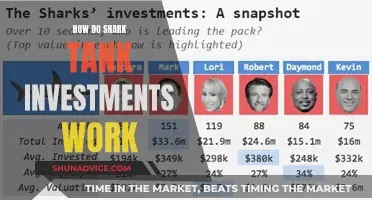
Buy the news is a strategy used by investors and traders to profit from short-term volatility in the market. The idea is to buy stocks or other assets in the days and weeks leading up to a favourable event, such as an earnings report, a new product announcement, or a stock split, anticipating that the price will rise as the event approaches. By the time the news is released, those who wanted to own the stock or currency already do, leading to a sell-off as people try to cash in their profits. This strategy recognises that rumours and news can have opposite effects on a security's price.
What You'll Learn
- News traders leverage market psychology and historical data to make decisions
- News traders tend to hold positions for a very short time as news impact fades quickly
- Positive news usually leads to individuals buying stocks
- Negative news normally causes people to sell stocks
- Traders try to anticipate the news, not just react to it

News traders leverage market psychology and historical data to make decisions
News traders are investors who make decisions based on news announcements. They leverage market psychology and historical data to make decisions, aiming to profit from short-term market volatility.
News traders focus on the market sentiment leading up to and immediately following significant news events. They use various tools and strategies, including analysing historical data such as past earnings reports, to predict how upcoming news will affect prices. By understanding specific markets, news traders can make educated guesses about the direction of security prices following news reports.
For example, a news trader might look at historical data to predict how an upcoming earnings report will impact a company's stock price. They may also set up queries and alerts to gather breaking news and correlate it with changes in price action. If certain criteria are met, they will enter a bullish or bearish position depending on their trading strategy.
News traders also consider the psychological factors that influence market behaviour. They recognise that emotions such as fear and greed play a significant role in trading decisions. By understanding these psychological factors, news traders can make more informed decisions about when to enter or exit a trade.
Additionally, news traders may use a strategy called fading, which involves trading in the opposite direction of the prevailing trend as enthusiasm wears off. For instance, if a stock opens sharply higher after a positive earnings announcement, a news trader might short-sell the stock intraday as they anticipate the optimism to fade.
Overall, by leveraging market psychology and historical data, news traders aim to profit from short-term market movements and volatility surrounding news events.
Investing in a Pre-Recession World: A Guide for the Retired
You may want to see also

News traders tend to hold positions for a very short time as news impact fades quickly
News traders are investors who make decisions based on news announcements. They attempt to profit by taking advantage of market sentiment before and after important news releases. They tend to hold positions for a very short time as the impact of news usually fades quickly after being made public.
News traders use scheduled announcements, such as earnings reports and economic updates, to take up positions that profit from short-term volatility. They can also trade on significant, unplanned events that impact the domestic or global economy, such as natural disasters or geopolitical flare-ups.
The adage "buy the rumour, sell the news" sums up the strategy of news traders. They buy stocks in anticipation of positive news, such as a new product announcement or favourable economic indicators, and then sell when the news is made public and the price has risen. This is because, by the time the event occurs, most people who want to own the stock already do, so there is no one left to buy and push the price higher.
News traders also try to profit from the timing or likely content of scheduled news announcements. When news is scheduled, such as earnings releases or Federal Reserve meetings, news traders play the odds on the significance of the announcement. They may also use historical data to predict how upcoming news will affect prices.
In most cases, news traders are a type of day trader, opening and closing trades on the same day. They need to be nimble and react quickly to changing market conditions to make a profit.
Retirement Redefined: A Balanced Investment Portfolio for the Over-65s
You may want to see also

Positive news usually leads to individuals buying stocks
Traders and investors who follow a 'buy the rumour, sell the news' strategy will often purchase stocks in the days and weeks leading up to an anticipated positive event, such as an earnings report or a stock split. They buy on the rumour, hoping to profit from the anticipated rise in stock price, and then sell when the news is made public and the price rises, to cash in on their profits.
However, this strategy doesn't always work. For example, in the case of Apple's 2020 stock split, the price fell over 20% in the three weeks following the event, as many traders sold their stock to lock in profits.
News traders try to profit from short-term volatility and usually hold their positions for a very short time, as the impact of news usually fades quickly. They focus on trading in the time leading up to the news or immediately after, when the market is still reacting and is characterised by high volatility.
It's important to note that not all news is anticipated or expected. Some news, like a massive auto safety recall, a geopolitical crisis, or a natural disaster, cannot be predicted and can wreak havoc on stock prices.
Investing: Nice People, Psychopaths?
You may want to see also

Negative news normally causes people to sell stocks
The saying "buy the rumor, sell the news" is a common adage in the world of investing. It refers to the tendency for stock prices to be influenced by news announcements, with traders trying to profit from market sentiment before and after the news is released. Negative news often causes people to sell stocks, leading to a decrease in stock prices.
Negative news can come in various forms, such as a bad earnings report, a lapse in corporate governance, economic uncertainty, or unexpected global events. For example, a company's quarterly earnings report may show a significant year-over-year increase, but if it falls short of Wall Street's expectations, it can still lead to a drop in stock price.
Traders and investors often try to anticipate news and make decisions based on market sentiment. They analyze various sources of information, such as government economic reports, company quarterly reports, and industry news, to predict how a stock might perform. However, there are always unexpected events that cannot be anticipated, such as natural disasters, political crises, or global pandemics, which can significantly impact stock prices and cause people to sell.
It's important to note that the impact of negative news on stock prices is not always straightforward. Sometimes, bad news for one industry or sector can be good news for another. For example, a hurricane might cause a decline in utility stocks but lead to an increase in home improvement retail stocks as people prepare for repairs.
Overall, negative news typically triggers selling pressure in the stock market, but it's essential for investors to carefully consider their investment strategies and time horizons before making decisions based solely on short-term news.
Planning for the Golden Years: Navigating Retirement Residency Investments
You may want to see also

Traders try to anticipate the news, not just react to it
There are two basic approaches to market timing: anticipatory and reactive. Anticipatory traders look at overall market conditions, consider the charts, fundamentals, and other factors, and then make a prediction about what the market will do next. They create a thesis and then buy, hoping it works. For example, currently, there are bulls in the market who believe that positive seasonality will occur and the market will enjoy a sizable rally to end the year.
On the other hand, reactive traders focus on the price action and make moves as the market develops. They do not have a strong market bias and focus on how the market reacts to news flow rather than forming opinions about the news. Reactive traders want to see some actual price action to confirm their predictions rather than just hoping that they are correct.
While some people get lucky and make good calls, this is more luck than skill. It is very difficult, if not impossible, to accurately forecast what the market will do. Therefore, reactive traders look to the price action, which reflects how people are investing. When big, well-connected institutions are buying or selling, this is reflected in the charts and in the price action.
News traders, in particular, try to profit by taking advantage of market sentiment leading up to the release of important news and/or trading on the market's response to the news after it is released. They use scheduled announcements to take up positions that profit from short-term volatility. They also trade significant, unplanned events that impact the domestic or global economy.
By using technical analysis, traders can anticipate certain market activity before it occurs. This involves drawing on previous chart patterns, probabilities of certain trade setups, and a trader's previous experience. Over time, anticipation can eliminate the need for over-analyzing market direction and identify clear, objective areas of significance.
Nokia: Invest Now or Miss Out?
You may want to see also
Frequently asked questions
"Buy the rumour, sell the news" is a common expression in the world of trading and investing. It means that if good news is expected in the future, the price of a stock or currency will often rise in anticipation, but may not necessarily rise further when the news actually breaks.
People tend to buy in the days and weeks leading up to a favourable event, such as an earnings report or a stock split for a company, or an interest rate rise for a currency. When the event occurs, there is no one left to buy, so people start selling to cash in their profits.
One example is Apple's stock split in August 2020. The price of Apple's stock rose over 40% in the month before the stock split, but fell over 20% in the three weeks after it. Another example is the COVID-19 pandemic, when traders bought safe-haven currencies like the Japanese yen and Swiss franc, but sold them again as more data was released about the severity of the virus.
First, open a trading account. Then, look for upcoming news announcements and determine whether the news is expected to be favourable. Do your research to decide if the asset is worth buying in advance of the news, or short-selling after the event. You can also consider placing a stop-loss order to control risk.







